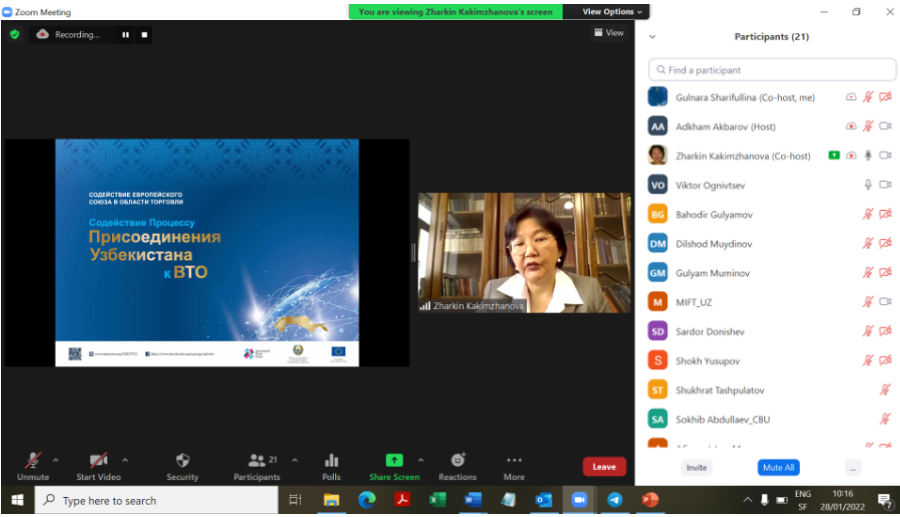Uzbekistan officials briefed on Kazakhstan’s WTO negotiation experience; and coordination between government agencies explained
11.02.2022 1599The World Trade Organization (WTO) is the custodian of an extremely sophisticated and intricate body of international law that regulates international trade between countries. As such, accession to the WTO is in itself a complex and multifaceted process involving negotiations between the acceding government and other WTO Members.
The process can take a very long time and is conducted both multilaterally and bilaterally. It requires of acceding members to often make significant reforms to their national regulatory regime in order to conform with WTO law. To make this happen, strong and effective internal coordination is one of the key factors in the accession process. Despite this formidable and challenging process, accession to the WTO holds enormous benefits for acceding countries.
This is so, because WTO membership, amongst others, facilitate policy transparency and the conformity with WTO laws means that barriers to trade are not arbitrarily introduced and a level playing field in the trade sphere is created between WTO countries. This enhances market access and stabilizes prices, which helps to buttress a country’s economic growth and development.
As negotiations towards Uzbekistan’s accession to the WTO are moving ahead, the International Trade Centre (ITC) organized an online workshop on 27 and 28 January 2022 to discuss WTO membership requirements and processes with relevant public sector representatives. The meeting was held under the auspices of the project: ‘Facilitating the process of Uzbekistan's accession to the WTO’, which is funded by the European Union (EU) and of which the ITC is the implementing partner.
On the first day the content of the WTO membership negotiations formed the nucleus of the briefing. Participants were introduced to the overall accession process to the WTO, which is regulated by the Marrakesh Agreement, Article XII and the WTO legal framework with its 17 binding multilateral trade agreements. The presentation was set against the backdrop of Kazakhstan’s experience during its WTO accession process, and thus provided the context of a peer country for meaningful comparison.
The key tenets of the WTO – namely its Most-Favored-Nation Treatment (MFN), National Treatment (NT) and the transparency principles – were explained. An update was also given of the main stages and participants of the accession process, at multilateral, plurilateral as well as bilateral level. The key documents of the accession package were reviewed and the briefing concluded with some recommendations to Uzbekistan’s on its negotiating stance in the accession process.
Questions were addressed in the area of services and agriculture. Uzbekistan was advised on a pragmatic approach with a view to align the negotiations outcomes with its economic development objectives .
Inter-Agency Commission to facilitate national coherence
A key challenge in the WTO accession process generally, is to coordinate all State agency inputs and ensure all national interests – both public and private – are equally represented to ensure a balanced and fair outcome for the country as a whole.
The second day of the training on 28 January, therefore focused on the ‘how’ and ‘what’ of coordination between the various government agencies and business partners in the process. The discussions zoomed in on the Inter-Agency Commission (IAC) on the WTO and its structure, goals and activities.
First, a session was dedicated to exploring how Kazakhstan coordinated between different government branches during its WTO accession process. The Kazakhstan government had also created an Inter-Agency Commission – the IAC of Kazakhstan on Trade Policy and Participation in International Economic Organizations – to steer the holistic representation of national interests.
This set the scene for discussing the IAC that was created by Uzbekistan to fulfil a similar function, notably through the establishment of working groups on key sectors of the negotiations. The process of coordinating and reaching agreement between various State bodies, and subsequently, with representatives of the private sector, was explained.
On the legislative part, the workshop focused on the establishment of an expert council on legislation on foreign trade and foreign investments in the Oliy Majlis – Uzbekistan’s parliament. The council would be tasked with reviewing the existing and adopted legislative acts to ensure their compliance with the WTO rules.
Some 37 people participated in the two-day training. The Ministry of Investments and Foreign Trade of the Republic of Uzbekistan (MIFT), which leads Uzbekistan’s WTO negotiations, was also in the lead during the workshop. Other ministries and agencies represented at the training included:
- the Ministry of Economic Development and Poverty Reduction,
- the Ministry for Development of Information Technologies and Communications,
- the State Tax Committee,
- the Export Promotion Agency,
- the Ministry of Transportation,
- the Ministry of Justice,
- the Ministry of Foreign Affairs,
- the Ministry of T
- the Ministry of Innovation,
- tourism and Sport,
- the State Customs Committee,
- the Central Bank of Uzbekistan.

